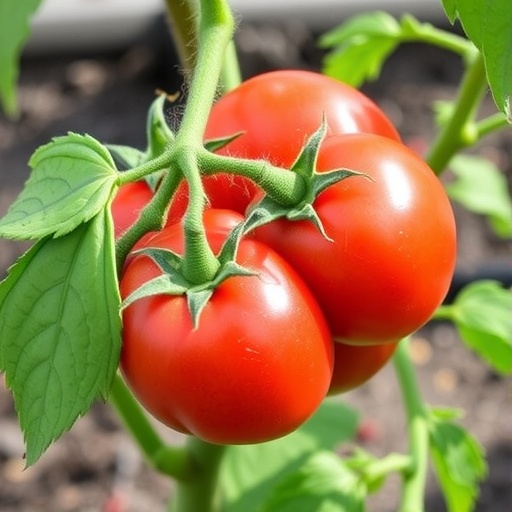
Researchers at the forefront of plant genomics have made significant strides in understanding how tomatoes respond to environmental stressors, particularly cadmium and salt stress. This heightened focus on the NRAMP family of genes, known to play crucial roles in metal transport and homeostasis, has unveiled intriguing insights into the evolutionary adaptations of tomato plants, specifically Solanum lycopersicum. The comprehensive study led by Ma et al. not only paves the way for agricultural advancements but also enhances the underlying genetic understanding of tomatoes under adverse conditions.
Tomatoes, a staple in global diets, face numerous biotic and abiotic challenges during cultivation. Among these, cadmium—an environmental contaminant—and salt stress are particularly detrimental, negatively impacting both growth and yield. The research team endeavored to systematically identify all NRAMP (Natural Resistance-Associated Macrophage Protein) family genes in the tomato genome, recognizing their potential role in mitigating the adverse effects of these stressors. Their findings serve as a vital resource for future genetic studies and agricultural applications.
The study commenced with a thorough genome-wide search for NRAMP genes within the tomato genome. Utilizing advanced bioinformatics tools, the researchers successfully cataloged numerous NRAMP family genes, each displaying unique expression patterns and evolutionary backgrounds. This expansive identification effort highlights the diversity and functional versatility of NRAMPs in plants, setting the framework for further examination of their roles in stress response mechanisms.
A significant aspect of the research involved analyzing the evolutionary conservation of these genes across various plant species. The team conducted comparative studies between Solanum lycopersicum and related species to unveil how these genes have evolved over time. This evolutionary perspective not only sheds light on the adaptive potentials of tomatoes but also enhances our understanding of plant responses to environmental stresses in a broader context.
Subsequently, the researchers delved into the functional characterization of the identified NRAMP genes. With various experimental methodologies, including gene expression profiling under cadmium and salt stress conditions, they elucidated the role of specific NRAMPs in enhancing tolerance levels in tomato plants. This functional analysis revealed that certain NRAMP genes are upregulated in response to stress, thus confirming their pivotal roles in metal transport and homeostasis under adverse conditions.
Interestingly, connectivity maps were generated to visualize the interactions among different NRAMP genes and their downstream signaling pathways. This systems biology approach allowed the researchers to identify key regulatory nodes that could be targeted for improving stress tolerance in tomatoes through genetic engineering or breeding programs. Understanding the complex network of gene interactions opens significant avenues for biotechnological interventions aimed at enhancing crop resilience.
As part of their study, the research team didn’t shy away from integrating field trials, confirming their laboratory findings with real-world applications. By cultivating transgenic tomato plants that overexpress specific NRAMP genes, they evaluated changes in plant physiology, resilience, and overall yield under both cadmium and salt stress. This translational aspect of their research reinforces the practical implications of the genomic insights garnered and places them within the framework of sustainable agricultural practices.
Furthering the narrative of evolutionary significance, the researchers illuminated how these NRAMP genes have not only adapted but also diversified in response to different environments. The multifunctionality and redundancy observed among various NRAMP members suggest a robust evolutionary strategy, enabling tomatoes to thrive despite the presence of heavy metals and salinity in soil. Thus, these findings contribute to the growing body of knowledge on plant adaptation strategies within the broader climate change discourse.
Additionally, the implications of the research extend beyond tomatoes, offering insights into the NRAMP family of genes across various crops. The fundamental understanding of these genes can serve as a blueprint for enhancing stress tolerance in other essential crops that face similar environmental challenges. The genomic information gathered in this study can fuel efforts to develop biofortified plants, incorporating desirable traits to ensure food security in an evolving climate.
Overall, the research conducted by Ma and colleagues is poised to revolutionize our approach to crop management and agricultural sustainability. By bridging the gap between genomic research and practical applications in horticulture, the study not only enriches scientific knowledge but also serves as a catalyst for change in agricultural strategies. Such advancements are essential to fostering resilient food systems capable of withstanding the future’s environmental pressures.
In conclusion, as the understanding of tomato NRAMP genes deepens, the potential for enhancing crop resilience against heavy metal and salt stress becomes promising. This research exemplifies the synergy between genomics and agriculture, unlocking new pathways for innovation in plant breeding and crop management. Importantly, this study underscores the necessity of continuous research in genomics, particularly within the context of global food security and sustainable agriculture.
The exploration of NRAMP family genes in tomatoes sets a strong precedent for ongoing research in the field, inviting further investigation into gene functions, regulatory networks, and evolutionary dynamics. This journey not only presents a scientific opportunity but also harnesses the potential to reshape agricultural practices for generations to come, ultimately benefiting both farmers and consumers as we strive for a more sustainable future.
Subject of Research: Genome-wide identification and evolutionary analysis of NRAMP family genes in tomato under cadmium and salt stress.
Article Title: Genome-wide identification and evolutionary analysis of NRAMP family genes in tomato (Solanum lycopersicum L.) under cadmium and salt stress.
Article References:
Ma, J., Li, S., Pehlivan, N. et al. Genome-wide identification and evolutionary analysis of NRAMP family genes in tomato (Solanum lycopersicum L.) under cadmium and salt stress.
BMC Genomics 26, 759 (2025). https://doi.org/10.1186/s12864-025-11955-6
Image Credits: AI Generated
DOI: 10.1186/s12864-025-11955-6
Keywords: NRAMP genes, tomato, Solanum lycopersicum, cadmium stress, salt stress, genome-wide identification, evolutionary analysis, crop resilience, sustainable agriculture, plant genomics.
Tags: abiotic stress management in agricultureagricultural advancements in tomato cultivationbioinformatics in plant studiescadmium stress in plantsenvironmental stress in tomatoesgenetic adaptation in tomatoesmetal transport in plantsNRAMP genes in tomatoplant genomics researchsalt stress response in tomatoesSolanum lycopersicum geneticstomato genome analysis




